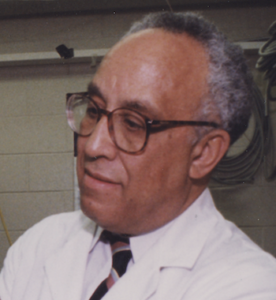
Robert V. Guthrie
*Robert V. Guthrie was born on this date in 1930. He was a Black psychologist, author, and educator.
Guthrie and his twin brother were born in Chicago. As a baby, his father, a school principal, picked up the family and moved to Richmond, Ky., then to Lexington, Ky., towns in great need of teachers for Black schools. Growing up in the segregated South left an indelible mark on Guthrie's career outlook. "I did not think I would have an outstanding career," he says. "I was simply growing up in segregated Kentucky, and as at that time black colleges were training teachers to operate primarily in the Southern schools, I figured I might be a public-school teacher. I did not know much about psychology. No one did." He attended Florida A&M University in 1948 by living "hand-to-mouth," he said.
Guthrie often took one meal a day in the kitchens of segregated restaurants off-campus to save money. "The black cooks would look out for us," he says, "so I could fill up on enough soul food to last the day." In a few introductory courses, Guthrie discovered psychology. Though the subject matter immediately intrigued him, Guthrie worried because there were few black opportunities in psychology. Nevertheless, the example set by his Black professors bolstered his courage. He credits a professor challenging his mind and strengthening his desire to be a psychologist: "Joseph Awkward was the man. He was the bomb," Guthrie exclaims. "He was a great teacher because he was enthusiastic and knowledgeable.
He served in World War II, was discharged, and returned to teach. That dedication motivated me." In 1950, Guthrie served in the Keesler Air Force Base in Biloxi, Miss., where he met and married Elodia Sanchez. The couple had six children. After doing this in Korea, Guthrie found it suited him to a military life where he felt equal because they had rules against racism. In 1953, after the war, Guthrie returned to Florida A&M with funding from the GI Bill; he also earned his master's at the University of Kentucky.
Guthrie returned to the military in 1960 and moved to San Diego, CA. He taught in public schools and at San Diego Mesa College part-time. In 1970, he earned his Ph.D. at the United States International University in San Diego. In 1976, Guthrie published his most famous work, Even the Rat Was White. This was a Historical View of Psychology, which exposed the history of psychology used to oppress blacks and promote the idea of black inferiority. The 2nd Edition of the book in 1998 responded to new developments, such as The Bell Curve.
Even more important than the examination of racist academic work was the book cataloging the work and triumphs of early Black psychologists. While he studied for his master's at the University of Kentucky, one of Guthrie's professors expressed doubts about the importance of contributions by Black psychologists, which inspired Guthrie to begin researching the work of Black psychologists that preceded him. Guthrie profiled pioneering Black psychologists and social scientists in his books, such as Francis Cecil Sumner, Kenneth and Mamie Clark, Allison Davis, Inez Beverly Prosser, Herman George Canady, Oran Wendle Eagleson, and Ruth Winifred Howard. They helped create a pipeline for Blacks to earn PhDs in psychology and join university faculties.
Guthrie retired in the early 1980s but remained in private practice. In 1990, Southern Illinois University made him a professor of applied experimental psychology, a tenured position until 1998. In 2001, Guthrie became the first Black to have his papers included in the National Archives of American Psychology in Akron, OH. The archive's director, David Baker, Ph.D., said about Guthrie: "We know almost nothing about the development of psychology at historically black colleges and universities, and only Bob Guthrie's work examines this in detail." Regarding Even the Rat Was White, he stated that the book is "an excellent piece of historiography that offers a good, hard look at racism in the development of psychology."
The American Psychological Association described Guthrie as "one of the most influential and multifaceted African-American scholars of the century." Robert Guthrie died on November 6, 2005, from brain cancer.